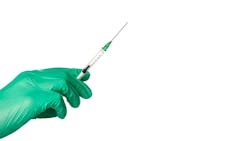One-dose HPV vaccine offers solid protection against cervical cancer
The World Health Organization (WHO) Strategic Advisory Group of Experts on Immunization (SAGE) evaluated the evidence that has been emerging over past years that single-dose schedules provide comparable efficacy to the two or three-dose regimens.
SAGE’s review concluded that a single-dose Human Papillomavirus (HPV) vaccine delivers solid protection against HPV, the virus that causes cervical cancer, that is comparable to 2-dose schedules. This could be a game-changer for the prevention of the disease; seeing more doses of the life-saving jab reach more girls.
Often referred to as the ‘silent killer’ and almost entirely preventable, cervical cancer is a disease of inequity of access; the new SAGE recommendation is underpinned by concerns over the slow introduction of the HPV vaccine into immunization programs and overall low population coverage, especially in poorer countries.
More than 95% of cervical cancer is caused by sexually transmitted HPV, which is the fourth most common type of cancer in women globally with 90% of these women living in low- and middle-income countries.
“The HPV vaccine is highly effective for the prevention of HPV serotypes 16 & 18, which cause 70% of cervical cancer,” said Dr Alejandro Cravioto, SAGE Chair. “SAGE urges all countries to introduce HPV vaccines and prioritize multi-age cohort catch up of missed and older cohorts of girls. These recommendations will enable more girls and women to be vaccinated and thus preventing them from having cervical cancer and all its consequences over the course of their lifetimes.”
SAGE recommends updating dose schedules for HPV as follows:
- One or two-dose schedule for the primary target of girls aged 9-14
- One or two-dose schedule for young women aged 15-20
- Two doses with a 6-month interval for women older than 21.
- Immunocompromised individuals, including those with HIV, should receive three doses if feasible, and if not at least two doses. There is limited evidence regarding the efficacy of a single dose in this group.
WHO’s recommendations will be updated following further consultation across stakeholders.
WHO Assistant Director-General Dr Princess Nothemba (Nono) Simelela commented, “I firmly believe the elimination of cervical cancer is possible. In 2020 the Cervical Cancer Elimination Initiative was launched to address several challenges including the inequity in vaccine access. This single-dose recommendation has the potential to take us faster to our goal of having 90 per cent of girls vaccinated by the age of 15 by 2030.”
Globally, the uptake of the life-saving vaccine has been slow, and coverage in countries much lower than the 90% target. Consequently, in 2020 global coverage with 2 doses was only 13%. Several factors have influenced the slow uptake and low coverage of HPV vaccines including supply challenges, as well as the programmatic challenges and costs related to delivering a two regimen to older girls who are not typically part of childhood vaccination programs. Added to this has been the relatively high cost of HPV vaccines, particularly for middle-income countries.
Dr Simelela continued “we need political commitment complemented with equitable pathways for the accessibility of the HPV vaccine. Failure to do so is an injustice to the generation of girls and young women who may be at risk of cervical cancer.”
The option for a single dose of the vaccine is less costly, less resource intensive and easier to administer. It facilitates implementing catch-up campaigns for multiple age groups, reduces the challenges link ed to tracing girls for their second dose and allows for financial and human resources to be redirected to other health priorities.”
Other meeting highlights of the April Strategic Advisory Group of Experts on Immunization (SAGE) convening include:
- COVID-19 Vaccines
- SAGE evaluated the data on the CanSino Bio (Ad5-nCOV-S) vaccine. The outcomes of this discussion will be made available subject to WHO EUL being granted.
- SAGE also discussed the evidence on the immunity from infection and in combination with vaccination (“hybrid immunity”) and requested a technical paper to be produced by WHO.
Hepatitis A - SAGE recommends that either one or two dose schedules of inactivated hepatitis A vaccine can be used by programs.
Poliovirus vaccine - SAGE endorsed calls for an intensified planning effort for “Oral Polio Vaccine (OPV) Cessation” to anticipate the post-certification of wild-type poliovirus eradication time, and the eventual global end of the use of all live, attenuated oral polio vaccines as part of routine immunization programs.
Immunization Agenda 2030 (IA2030) -SAGE endorsed IA2030’s report “Guiding Principles for recovering, building resiliency, and strengthening of immunization in 2022 and beyond” .
